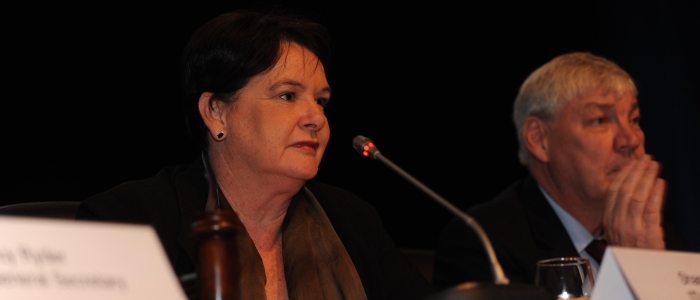The ITUC Congress will focus its debate on different themes, such as the global financial and economic crisis, and will consider resolutions on peace, youth, human and trade union rights and equality. Delegates at Congress will deal with issues related to labour’s demands for restructuring and reform of the global economy with an emphasis on themes such as workers’ rights, migrant workers, climate change and HIV-AIDS.
Speakers and panellists expected at the Congress include Dominique Strauss-Kahn, Managing Director of the International Monetary Fund; Pascal Lamy, Director-General of the World Trade Organization; Helen Clark, Administrator of the United Nations Development Programme; Argentina’s President, Cristina Fernández de Kirchner; and Kari Tapiola, Executive Director of the International Labour Organization.
The Canadian Labour Congress (CLC), which represents 3.2 million members, is hosting the ITUC Congress. CLC President Ken Georgetti reminded delegates of the province of British Columbia’s “proud and militant history of trade unionism”. He proposed that those traditions of labour solidarity should serve to stop the CEOs and banks who “put greed before need” and caused the global recession, and who are now pressuring governments to undertake “mindless deficit reduction” instead of protecting jobs and public services.
In a live broadcast address from New York, George Papandreou, Prime Minister of Greece, spoke of his country’s current economic problems and pointed out that Greece does not have a lavish welfare system, as some conservative commentators have claimed, but that the crisis originated in economic mismanagement . “During the current crisis, trade unions are needed more than ever to fight for workers’ rights, sustainable development and a just world order,” said Papandreou. He also endorsed the creation of a financial transaction tax (FTT) to provide needed revenue for job creation, the green economy and development assistance, and to help “control destructive speculation”.
ITUC President Sharan Burrow noted that trade unions had warned global decisions-makers of the dangers of global imbalances and the lack of regulation to rein in corporate greed well before the global financial system came to the brink of collapse in 2008. Political leaders initially recognized the need to rebalance the global economy and put employment at the heart of economic recovery, but in the past two months, “one European government after another is being forced into a premature and suicidal rush to implement austerity measures to pacify reckless financial markets. The possibility of a double-dip recession has now become a probability.”
“Nobody argues that fiscal consolidation is not important over time,” said Burrow, “but it is the timing that is critical and it requires a growth strategy that can soak up debt, without further attacks on the livelihoods and living standards of working people, and the threat of further economic turmoil.” She rejected the approach of those who would return to the failed “Washington Consensus” policies of the 1980s and 1990s and instead advocated the alternate policy options put forward by the global trade union movement, consisting of income-driven growth, improved social protection, green jobs, investment in education and research, and protection of workers’ rights.
ILO Director General Juan Somavia, in a message delivered in his absence, stated that “trade unions are an indispensable part of the economy and democracy” and that “the world needs the strong unions that you are building more than ever”, since they remind decision-makers of “the need to focus on the social deficit” rather than solely on fiscal deficits.
The ITUC Congress is scheduled to elect the new leadership for the next four years on the last day of deliberations, Friday.


